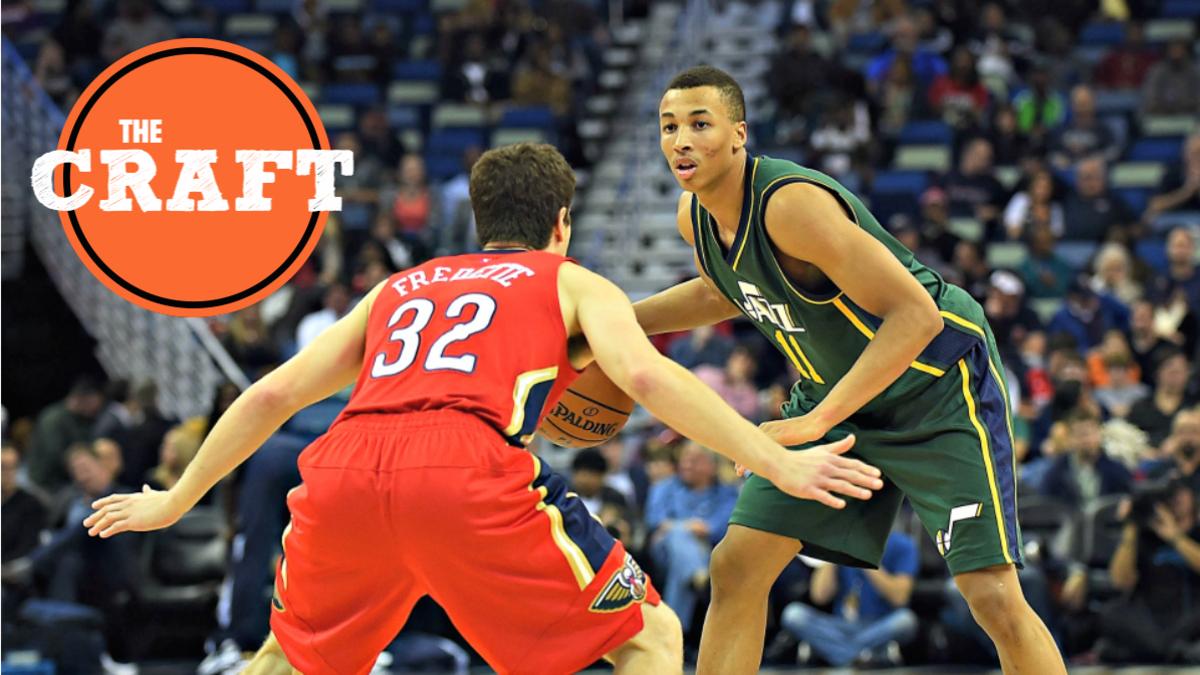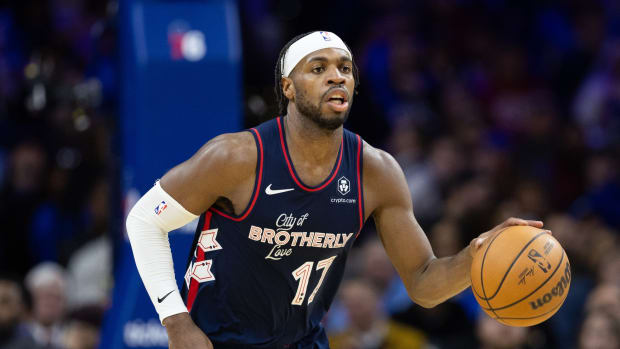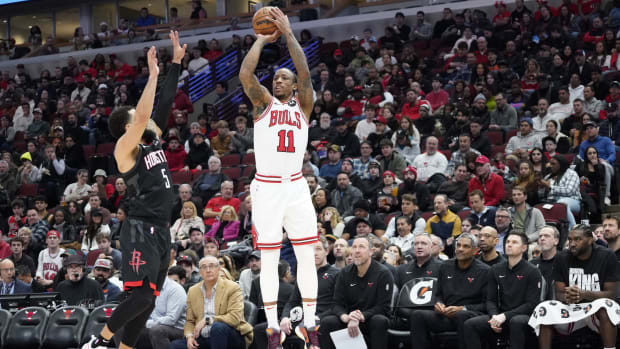The Craft: Dante Exum’s development
Welcome to The Craft, a serial look inside the world of player development in the NBA.
"What kind of player do you hope to become?"
I pose this question to Jazz rookie Dante Exum—a rangy, 6-6, 19-year-old point guard—in part out of sheer curiosity. There are players for whom this bit is rehearsed, akin to another of Exum's age reciting their college major and career prospects in particular fashion. Exum doesn't commit to that script. He cracks wise ("Well, have you seen Steve Novak?"), mulls over the question, and tells the truth.
"You know, I don't know," Exum says.
The beauty of the NBA is that he doesn't have to know yet. Basketball prospects might be widely discussed in concrete, matter-of-fact terms, yet those evaluations are mere feints at certainty. There is no convenient comparison for Exum, which leaves open a tantalizing—and perhaps terrifying—array of possibilities. From an organizational standpoint, the Jazz have been patient in their push to find out what Exum might be capable of. The native Australian was selected with the No. 5 pick in the 2014 draft and has been brought along slowly since. Exum came off the bench for 41 of his first 42 NBA games to average a modest 18.9 minutes per game for a team squarely out of playoff contention. He has since crawled his way into the starting lineup to supplant sophomore Trey Burke, a guard of a dramatically different play style.
• THE CRAFT: Wesley Matthews | Andre Drummond | Tyson Chandler
At every other level of basketball, Exum—like Burke—has been an instrument of attack: He drove, he maneuvered, he finished in traffic. In the NBA this is not yet so. Despite spending the bulk of his minutes as Utah's nominal point guard, Exum defaults to the corners while others create. This is where Exum spends his time on the floor on offense (as tracked by SportVU):
Heatmap courtesy of NBAsavant.
The growing pains were inevitable. Exum came up through basketball as a slashing point guard and approaches the game through that lens. His role with the Jazz should cultivate a different set of complementary skills, though in the meantime it divorces the young guard from the style he's long known. There is a trial in that adjustment, if also a sense of apprenticeship.
"It is one of the most difficult things ever," Exum says. "For me—being in a system like in Australia—I've always been a guy that's had the ball in his hands most of the time, at the end of the shot clock, end of the game. But it's been good taking that backseat role and seeing guys who've been in this league four or five years and how they're able to position themselves to score. I'm kind of at the point where I want to be given a bit of that responsibility and try to make the most of it."
[daily_cut.NBA]One can sense a disconnect in Exum's play. Clearly he's more comfortable with the ball in his hands than not. Yet on those possessions where he's finally in a position to dictate action, he'll often glide around on the perimeter before resorting to a passive outlet or long jumper. Whereas the most assertive guards in the league tend to attack in straight lines, Exum lilts in softer arcs. This is neither indicative of the player Exum has been nor the player he wishes to be, and that bugs him.
"I'll come off an on-ball [screen] and the middle of the floor is open," Exum says. "It's just me and my guy. Instead of using body contact to go through him, it's more I just kind of kick it on and pass it, which frustrates me in a way. But it's just about getting rid of that habit that I've created and trying to be strong all the way through.
"I think it's not even a confidence thing. I think I have the confidence to go do it, I just think it's being more aggressive and having that mentality to go out and when I get the opportunity, take it."
Ask around about Exum and the word "aggressive" tends to come up in almost every conversation. It's natural for a player of Exum's age and experience level to be somewhat tentative, though to this point he ranks No. 33 even among his rookie peers in field goal attempts per minute. As was noted on SLC Dunk, Exum hasn't attempted a free throw since Jan. 10. It's Exum's instinct to let the game come to him, though clearly the fast, physical NBA game hasn't gone out of its way to meet him in the middle.
Exum's first developmental priority, then, lies in satisfying his "aggressive" deficit. But what does being aggressive on the floor mean to him?
Fifty notes, quotes and anecdotes from 2015 MIT Sloan conference
"There's obviously different types of aggression," Exum says. "But the way I look at it is, if you watch Gordon [Hayward] play, he's looking at the second line of defense. He beats his man easy and then it's about creating the contact to finish. Sometimes I get in there and it's trying to finish over someone with the floater. It's about going in and making the contact and being aggressive in being hit."
Knowing this and internalizing it are very different matters. There are games where Exum is deliberately more assertive, whether by his own determination, Quin Snyder's instruction, or some other influence. But clearly his comfort level in handling NBA defenses hasn't reached the point where applying pressure comes naturally.
That kind of shift takes time, though in Exum's case it begins with skill work. To this point, Exum hasn't been especially effective in converting his attempts at the rim even on those occasions where he works his way in there. Given that, his wobbly confidence in that space undoubtedly plays a role in those split-second determinations of when to pass and when to drive.
"I really want to start working on my finishing," Exum says. "From what I'm used to there's not a lot of athletic, big guys around the rim. So it's about getting there, knowing what to do and how to finish or making the right play.
"That's one of the hardest things because you really can't go into a gym and just work on it yourself. With creating contact, it's about getting with a coach and having a pad. Just using that soft pad to get hits, take hits, and try to finish around the basket doing different finishes. Then, trying to put it in the game and in practice whenever you get the chance."
• MORE NBA: Jazz continue rise in SI.com's latest Power Rankings
Exum addresses his on-court discomforts without the slightest evidence of anxiety. Already, at 19, he understands his responsibilities by the playbook and how to function in more improvisational situations. He knows what he can accomplish with the ball in his hands and projects an easy confidence in his ability to do the same against NBA competition. He's also very much aware that what he's doing now is a work of transition—a gradual, introductory step into a much larger world.
While the Jazz wait for Exum to cross that career threshold, they can lean on more immediate defensive returns. No rookie comes into the NBA a fully formed defender. Exum, though, is already impressive for how he bothers opposing point guards with his length and maneuvers to complicate their drives. Watch as he hangs with Tony Parker on this push toward the basket:
Or as he matches every pace of Jordan Clarkson's drive:
Or as he slinks around series of screens to save his team a rotation:
All of this from a player still figuring out the nuances of NBA defense and the personnel he covers. That no rookie comes into the NBA a fully formed defender works as something of an omen, in Exum's case—that he's already so pesky and effective warns of how suffocating the rookie might soon become. By having the quickness of a point guard and the size of a wing, Exum's close-outs and double-teams take on an elastic quality valuable to Utah's resurgent defense. In fact, the Jazz lead the NBA in defensive rating (87.1 points per 100 possessions) since the All-Star break.
Those contributions allow Exum to take his rookie season in stride. He's deep, at this point, in the protracted process of on-court learning in all facets of the game. At the same time, Exum is coming to terms with life as a professional, as an NBA player, and as a prospect of whom much will be expected.
"You just don't realize how mentally fatiguing it is, more than anything, just to have to be on your game every night," Exum says. "Scouting report, focusing on players because every player is different. It's a different scouting report, different way of playing different opponents every night."
The challenges never stop. At the moment, it's the aforementioned developmental kinks and the fortitude of the rookie wall. Later, it will be the way Exum reads help defense and overcomes opponents scouted to stop him. There will always be some new test, no matter what kind of player Exum turns out to be. So for now, he waits—parked in the corner, learning all the while.




































